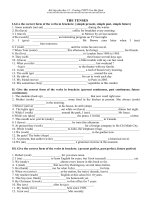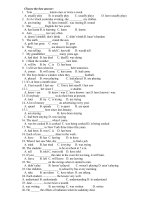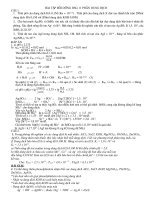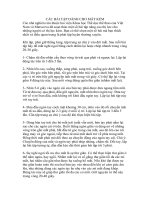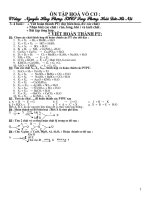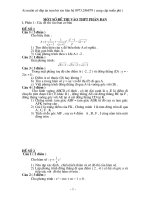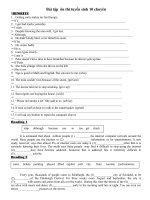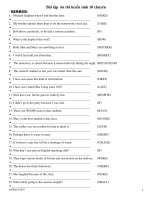bai tap thi
Bạn đang xem bản rút gọn của tài liệu. Xem và tải ngay bản đầy đủ của tài liệu tại đây (294.29 KB, 15 trang )
<span class='text_page_counter'>(1)</span>THÌ VAØ CAÙCH DUØNG CỦA 5 THÌ (HTĐ – HTTD – HTHT – QKĐ – QKTD) ( PHẦN 1) I. SIMPLE PRESENT TENSE.(Thì hieän taïi ñôn) A. Caùch thaønh laäp 1. Affirmative I , We, You, They + Verb (infinitive) He, She, It + Verb-s/es 2. Negative I, We, You, They + do not + Verb (infinitive) He, She, It + does not 3. Question Do + I, We, You, They + Verb (infinitive) Does + He, She, It B. Cách thêm “s” và “es” đối với động từ có chủ từ ở ngôi thứ ba số ít. 1. Ta thêm “s” vào hầu hết các động từ khi đi với chủ từ ở ngôi thứ ba số ít. Ex: He looks She comes 2. Ta thêm “es” vào các động từ tận cùng bằng o, s, sh, ch, x, z . Ex: watch He watches wash She washes pass It passes relax He ralaxes 3. Ta đổi “y” thành “i” và thêm “es” khi động từ tận cùng bằng “y” đứng trước “y” là một phụ aâm. Ex: carry He carries hurry She hurries Ta thêm “s” vào sau động từ tận cùng bằng “y” nếu đứng trước “y” là một nguyên âm. Ex: enjoy She enjoys obey He obeys C. Caùch duøng 1. Diễn tả một thói quen ở hiện tại.(thường dùng với các trạng từ: often, usually, always, sometimes, generally, everyday, seldom) Ex: They walk to school everyday. He often gets up at 6 a.m. every morning. 2. Dùng để chỉ các hiện tượng thiên nhiên, các qui luật vật lí. Ex: The sun rises in the east and sets in the west. The earth moves around the sun. 3. Diễn tả chân lý lúc nào cũng đúng. Ex: Two and two are four. 4. Diễn tả một hành động trong tương lai xảy ra theo thời khóa biểu. Ex: The train leaves at 4 p.m. We leave Hanoi at 8 p.m. next Saturday and arrive in Ho Chi Minh City at 10 p.m. 5. Dùng trong các mệnh đề chỉ thời gian. (bắt đầu bằng when, as soon as, before, after) Ex: When I come here, I see nothing. When it rains, you should take an umbrella. 6. Dùng trong câu điều kiện loại 1 trong mệnh đề “IF” Ex: If you come, I will let you know. If you are sick, we will come to see you. 7. Dùng để kể lại câu chuyện trong quá khứ hoặc dùng để tường thuật lại các sự kiện thể thao trong quá khứ..
<span class='text_page_counter'>(2)</span> Ex:. The story is about a girl called Little Red who lives with her mother. Little Red’s grandmother invites her to her cottage, so one fine day she sets off to visit her. . . II. PRESENT CONTINUOUS TENSE.(Thì hieän taïi tieáp dieãn) A. Caùch thaønh laäp 1. Affirmative. I + am We, You, They + are + V-ing He, She, It + is 2. Negative Subject + am/is/are + not + V-ing 3. Question Am / Is / Are + subject + V-ing ?. B. Cách thêm đuôi “ING” vào sau động từ. a. b. c. d.. Động từ tận cùng bằng “E” ta bỏ “E” rồi thêm “ing” (Ex: come coming, drive driving) Động từ tận cùng bằng “IE” ta đổi thành “Y” rồi thêm “ing” (Ex: die dying, lie lying) Động từ tận cùng bằng “IC” ta đổi thành “ICK” rồi thêm “ing” (Ex: traffic trafficking) Động từ có một âm tiết tận cùng bằng 1 phụ âm, trước phụ âm là 1 nguyên âm. Ta gấp đôi phụ âm trước khi thêm “ing”. Ngoại trừ các phụ âm W, H, Y, X. (Ex: run running, sit sitting. Nhưng mix mixing) e. Động từ có hai âm tiết tận cùng bằng 1 phụ âm, trước phụ âm là 1 nguyên âm.Và có trọng âm ở âm cuối. Ta gấp đôi phụ âm trước khi thêm “ing”. Ngoại trừ các phụ âm W, H, Y, X.(begin beginning, permit permitting). C. Caùch duøng: 1. Diễn tả hành động đang diễn ra lúc nói. (Thường đi với những trạng từ như: now, at the moment, at the present, at this time. . . ) Ex: He is sleeping in his room now. We are all waiting for you now. 2. Diễn tả hành động đã được sắp sếp trước để thực hiện trong tương lai gần. Ex: We are spending next summer in Nha trang. I am going to Hue next week. 3. Diễn tả hành động lặp lại nhiều lần hay do thói quen, nó gây ra sự bực mình, khó chịu. Ex: My mother is always helping the other. He is always making noise. D. Chuù yù:. * Một số động từ sau đây thường không dùng với thì tiếp diễn. 1. Những động từ chỉ cảm xúc như: like, dislike, love, hate, want, wish, desire, refuse, forgive. 2. Những động từ chỉ giác quan như: see, hear, smell, sound, taste, recognize. 3. Những động từ chỉ lí trí như: understand, know, think, realize, suppose, believe, remember, forget, mind, expect, recollect. * Nhưng động từ look at, watch, listen to, ta có thể chia ở thì này. Ex: He is listening to the radio. They are looking at the map.. III. PRESENT PERFECT TENSE.(Thì hiện tại hoàn thành) A. Caùch thaønh laäp 1. Affirmative I, We, You, They + have + Past participle (PP) He, She, It + has 2. Negative Subject + have not/has not + Past participle (PP).
<span class='text_page_counter'>(3)</span> 3. Question Have / Has + subject + Past participle (PP) ? B. Caùch duøng: 1. Diễn tả một hành động đã xảy ra trong quá khứ nhưng vẫn còn tiếp tục đến hiện tại. (Thường đi với since, for) Ex: I have been a teacher since 1999. She has learned English for two years. 2. Diễn tả một hành động vừa mới xãy ra. (thường đi với từ :just, recently, lately) Ex: She has just gone out. He has just finished his homework. 3. Diễn tả một hành động xảy ra trong một thời gian không được xác định. (thương đi với “ever, never”) Ex: This is one of the best novels that I have ever read. Have you ever driven a car? .No, I haven’t. I have never driven a car. 4. Diễn tả một hành động bắt đầu ở quá khứ nhưng chấm dứt vào lúc ta nói. Ex: This classroom hasn’t been cleaned for week. The value of the house has increased in the last four years. C. Caùch duøng cuûa “since, for” 1 For: dùng trước một khoảng thời gian. (period of time) Vi dụ: for three hours, seven days, two months…… For: dùng với thì hiên tại hoàn thành, chỉ một khoảng thời gian kéo dài đến hiện tại. Ex: We have lived in Saigon for ten years. For: dùng với thì quá khứ đơn, chỉ một khoảng thời gian đã qua hẳn. Ex: We lived there for ten years. 2 Since: dùng trước một điểm thời gian. (point of time) Ví dụ: since 1999, since 6 a.m………… Ex: We have lived in Saigon since 1958. IV. SIMPLE PAST TENSE.(Thì quá khứ đơn) A. Caùch thaønh laäp 1. Affirmative. Subject + V-ed/column2 2. Negative Subject + did not + V-infinitive 3. Question Did + subject + V-infinitive? B.Caùch duøng 1. Diễn tả một hành động đã xãy ra và chấm dứt ở một thời điểm xác định trong quá khứ. (Thường đi với (yesterday, last week/year……, three days/four weeks ago, in 1990) Ex: The train arrived ten minutes ago. He did not work very hard yesterday. 2. Diễn tả một thói quen trong quá khứ. (Thường đi với động từ used to) Ex: I often played football when I was young. When I was young, I went fishing twice a week. 3. Diễn tả một chuỗi hành động xãy ra liên tục trong quá khứ. Ex: She went out of the car, unlocked the door and went into the house……… He returned to the bedroom, took off his clothes and went into the bathroom…… 4. Được dùng với nghĩa hiện tại trong mệnh đề IF (câu điều kiện loại 2).
<span class='text_page_counter'>(4)</span> Ex: If I were you, I wouldn’t talk to him. They would write to you if they knew your address. C. Cách thêm “ed” sau động từ có quy tắc. 1. Ta thêm “ed” vào hầu hết các động từ có quy tắc. Ex: return returned help helped learn learned 2. Ta thêm “d” vào sau động từ, nếu động từ tận cùng bằng chữ “e”. Ex: live lived create created die died 3. Nếu động từ có một âm tiết, tận cùng bằng một phụ âm, trước phụ âm cuối là một nguyên âm ta phaûi gaáp ñoâi phuï aâm cuoái vaø theâm “ed” vaøo. Ex: hop hopped rub rubbed Ta không gấp đôiphụ âm cuối đối với những phụ âm: w, x, y Ex: bow bowed mix mixed Nếu động từ có hai âm tiết, trọng âm được nhấn ở âm thứ hai thì ta cũng phải gấp đôi phụ âm cuoái vaø theâm “ed” vaøo. Ex: prefer preferred permit permitted 4. Nếu động từ tận cùng bằng chữ “y” trước “y” là một phụ âm ta đổi “y” thành “i” và thêm “ed” vaøo. Ex: worry worried study studied Nếu trước “y” là một nguyên âm thì ta không đổi “y” thành “i” được. Ex: play played annoy annoyed V. PAST CONTINUOUS TENSE. (Thì quá khứ tiếp diễn) A. Caùch thaønh laäp. 1. Affirmative We, You, They + were + V-ing I, He, She, It + was 2. Negative Subject + was not / were not + V-ing 3. Question Was / Were + subject + V-ing? B. Caùch duøng. 1. Diễn tả một hành động đang diễn ra tại một thời điểm xác định trong quá khứ. Ex: He was watching film on T.V at 11 o’clock last night. What were you doing at 8 o’clock last night ? 2. Diễn tả một hành động đang tiếp diễn trong quá khứ thì một hành động quá khứ khác bất chợt xảy đến. Ex: Mary was washing her hair when the phone rang. While I was having dinner, my friend came. Chú ý: Hành động bất chợt xảy đến được chia ở thì quá khứ đơn. Ta dùng “While” cho hành động đầu và “When” cho hành động sau. 3. Diễn tả 2 hay nhiều hành động đang diễn ra đồng thời trong quá khứ. Ex: My mother was cooking in the kitchen while my father was watching T.V. Tom was doing his homework while his brother was playing game on computer. Chú ý: Hành động này thường đi với liên từ “While”..
<span class='text_page_counter'>(5)</span> (Còn 8 thì nữa) Exercises I. Put the verbs in brackets into the simple present tense. 1. The director often (return) ……….. . . . . home late. 2. It (not, rain) . ………………. . . . in the dry season. 3. The sun (rise) . . …………. . . . in the East and (set). . …………. . . . in the West. 4. . . . …… . you (notice) . ………………... . . . any change in her? 5. If you (go) . . . …….. . . to the party, you will meet you. 6. The swimming pool (open) . . ………. . at 6.00 a.m. and (close) . …….. . . . at 10.00 p.m. everyday. 7. What …………….. . . . . you often (do) . . . . …………... . in the morning? 8. . . . . ……………. . he always (go) . . . . …………... . to work by bus? 9. . . . . …………. . . rivers usually (flow) . . . . . ………….. to the sea? 10. Light (travel) . . ……………………... . . .faster than sound. II. Put the verbs in brackets into the present continuous tense. 1. The farmers (work) . . . …………………... . . in the field now. 2. Listen! Someone (knock) . . …………….. . . . at the door. 3. Goodbye! I (leave) . . . …………………... . . now. 4. Be quiet! The baby (sleep) . ……………… . . . . 5. Where . …………………. . . . . you (go) …………….. . . . . . now? III. Put the verbs in brackets into the present perfect tense. 1. I (never, visit) . . . …………………….. . . Australia. 2. He (live) . . ……………….. . . . in this flat since 1995. 3. . . . . ………………… . you (study) . . . . . ………………... English for five years? 4. How many times . . ………….. . . . he (see) . . . . …… . you since you went to London? 5. My mother (work) . . ……………… . . . in this factory since 1988. 6. George (see) . . . ……………………. . . this movies three times. 7. They (watch) . . . …………………. . . football since three o’clock. 8. We (not begin) . . ………………… . . . to study for the best yet. 9. He (just go) . . . ………………….. . . to bed when the door bell rang. 10. . . . . . . your family (live) . . . . . . in Ho Chi Minh City since 1997? IV. Put the verbs in brackets into the simple past tense. 1. What . . …………… . . . you (say) when you (see) . . . ………….. . . him last week? 2. Why . . ……………. . . . you (not tell) me about her family before? 3. It would be better if you (go) . . ……………... . . . there yourself. 4. He (teach) . . . ……. . . English in our school 4 years ago. 5. I (mail) . . . ………. . . the letters when I went out to lunch. 6. He always (wear) . . …. . . a raincoat and (carry) . . . . . . an umbrella when he walked to the office. 7. The Williams (move) . . . …………….. . . into their new apartment last month. 8. He needed some money, so he (sell) . . ……………. . . . his car. 9. Tom (go) . . …………….. . . . downtown at 7.00 this morning. 10. If we (not buy) . . . ………………….. . . grain, we wouldn’t be able to raise animals for meat V. Put the verbs in brackets into the past continuous tense. 1. They suddenly realized that they (travel) . . ……………... . . . in the wrong direction. 2. As he (eat). . . ……………….. . . , he couldn’t answer clearly. 3. What. . . ……………. . . you (do). . . ………………. . . at 7.00 last night? 4. He (sit). . . ……………. . . in the garden when it started to rain. 5. …………. . . . . . he (play). . . . …………. . chess at 8.00a.m this morning?.
<span class='text_page_counter'>(6)</span> 6. While he (learn). . . . ………… . . . to drive he had twenty-five accidents. 7. He had a bad fall while he (repair). . . …... . . . . . . his roof. 8. While we (fish). . . . . . . ………... . someone came to the house and left this notes. VI. Supply the correct verb forms: The simple present tense or The present continuos tense: 1. Be quiet! The baby (sleep). 2. We seldom (eat) before 6:30. 3. Look! A man (run) after the train. He (want) to catch it. 4. The Sun (set) in the West. 5. It (be) often hot in summer. 6. I (do) an exercise on the present tenses at this moment and I (think) that I (know) how to use it now. 7. My mother sometimes (buy) vegetables at this market. 8. It (be) very cold now. 9. It (rain) much in summer. It (rain) now. 10. Daisy (cook) some food in the kitchen at present. She always (cook) in the morning. VII. Supply the correct verb form: The present perfect or The present perfect continuos: 1. How long you (study) English? For 5 years. 2. I (wait) for two hours, but she (not come) yet. 3. They (live) in Ho Chi Minh City since 1975. 4. She (read) all the books written by Charles Dickens. How many books you (read)? 5. He (not, be) here since Christmas, I wonder where he (live) since then. 6. Jack (go) to Paris for a holiday. He never (be) there. 7. You (sleep) so far? I (ring) the bell for the last twenty minutes. 8. He (write) a novel for two years, but he (not finish) it yet. 9. Mary (lose) her hat and she (look) for it until now. 10. I (see) that film several times because I like it. VIII. Supply the correct verb form: Present tenses. 1. Listen! I (think) someone (knock) at the door. 2. Up to the present, we (write) almost every lesson in the book. 3. The Earth (circle) the Sun once every 365 days. 4. The farmers (work) in the field at the moment. 5. How many times you (see) him since he went to Edinburgh? 6. Rivers usually (flow) to the sea. 7. Look! The boy (cry). 8. Do you know that man, who (smoke) there? 9. Mrs Green always (go) to work by bus. 10. We (be) from French. We (be) there for twenty years. IX. Supply the correct verb form: Simple past or Present perfect. 1. I (see) her before. 2. I (see) her last year. 3. Tom never (be) in Hanoi. 4. I (read) the novel written by Jack London several times before. 5. What you (do) yesterday? 6. You (watch) TV last night?.
<span class='text_page_counter'>(7)</span> 7. She (be) born in 1980.. Phonetic Symbols (Các ký hiệu phiên âm).
<span class='text_page_counter'>(8)</span> P H O N E T I C. .B A N K ( theory and examples ). Short Vowel sounds Nguyên âm ngắn. Long vowel sounds Nguyên âm dài. Diphthongs Nguyên âm đôi. Consonants Phụ âm. voiceless. -. Vô thanh. h. voiced Hữu thanh a, e, i, o, u : all vowel sounds are voiced. " - s / -es ". .... - third person " s " endings. " -ed ". .. .- the past of the regular verbs ( - ed ). Silent letters: Âm câm. . . . . no soundovación. Giải thích thêm cách phát âm “S” và “ED” 1. Cách phát âm chữ cái “s” đối với động từ có chủ từ ở ngôi thứ ba số ít. * H÷u thanh /b, d, g, v, ð, z,ʒ,ʤ, m,n, ,l,r,,j,w/ + toµn bé nguyªn ©m a,e,o,u,i. * V« thanh /p,t,k,f,θ,s,∫,t∫,h/ Quy t¾c c¬ b¶n của viÖc ph¸t ©m c¸c tõ tËn cïng víi ‘s’: ‘s’ đợc phát âm là /z/ khi theo sau các âm hữu thanh( trừ 3 âm /z, ʒ,ʤ/) ‘s’ đợc phát âm là /s/ khi theo sau các âm vô thanh trừ 3 âm/ s,∫,t∫ / ‘s’ đợc phát âm là / iz/ khi đi sau các âm / z, ʒ,ʤ, s,∫,t∫ / 2. Cách phát âm “ed” đối với động từ có quy tắc. * H÷u thanh /b, d, g, v, ð, z,ʒ,ʤ, m,n, ,l,r,,j,w/ + toµn bé nguyªn ©m a,e,o,u,i. * V« thanh /p,t,k,f,θ,s,∫,t∫,h/ Quy t¾c c¬ b¶n của viÖc ph¸t ©m c¸c tõ tËn cïng víi ‘ed’: Động từ tận cùng bằng ‘ed’ đợc phát âm là /d/ khi theo sau các âm hữu thanh ( trừ âm /d/ ) Động từ tận cùng bằng ‘ed’ đợc phát âm là /t/ khi theo sau các âm vô thanh ( trừ âm /t/ ) Động từ tận cùng bằng ‘ed’ đợc phát âm là /id/ khi theo sau các âm /t, d/. Qui tắc đánh dấu trọng âm Trọng âm (stressed syllable) của một từ là một vần hay một âm tiết của từ đó đợc đọc mạnh và cao hơn những vần còn lại, nghĩa là phát ra âm đó với 1 âm lợng lớn hơn và cao độ hơn..
<span class='text_page_counter'>(9)</span> Quy tắc. maintain explain descend consent .... . 2. §a sè c¸c danh tõ vµ tÝnh tõ 2 mountain evening butcher carpet ©m tiÕt th× träng ©m chÝnh nhÊn vµo ©m tiÕt thø nhÊt busy village summer pretty birthday porter morning winter beggar table handsome ..... 3. Mét sè tõ võa mang nghÜa object produce absent danh tõ hoÆc tÝnh tõ th× träng ©m record chÝnh nhÊn vµo ©m tiÕt thø nhÊt, import export present suspect nếu mang nghĩa động từ thì rebel träng ©m chÝnh nhÊn vµo ©m tiÕt increase contact progress thø hai. extract desert insult contrast conflict protect subject decrease 4. Danh tõ ghÐp thêng cã träng footpath tea-cup film- maker ©m chÝnh nhÊn vµo ©m tiÕt ®Çu tiªn. raincoat airline speed limit bookshop sunrise wastebasket baseball airport snowstorm shortlist hot-dog typewriter bedroom shorthand high school suitcase bathroom dishwasher passport phonebook volleyball 5. TÝnh tõ ghÐp thêng cã träng home - sick air- sick ©m chÝnh nhÊn vµo tõ thø ®Çu tiªn, nhng nÕu tÝnh tõ ghÐp mµ tõ praise- worthy water- proof ®Çu tiªn lµ tÝnh tõ hay tr¹ng tõ lighting- fast ... hoÆc kÕt thóc b»ng ®u«i - ED th× trust- worthy 1. Đa số các động từ 2 âm tiết thì träng ©m chÝnh nhÊn vµo ©m tiÕt thø 2.. en'joy allow attract relax. Ngo¹i trõ. Ví dụ escape accept collect destroy assist repeat forget accent. träng ©m chÝnh l¹i nhÊn ë tõ thø hai . Tơng tự động từ ghép và tr¹ng tõ ghÐp cã träng ©m chÝnh nhÊn vµo tõ thø hai. 6. C¸c tÝnh tõ cã tËn cïng lµ : ant, - ent, - able, - al, - ful, - les, - constant competent y,- ly, - ous sÏ cã träng ©m chÝnh homeless rocky nhÊn vµo ©m tiÕt ®Çu.. natural dirty careful liable distant current facial happy careless powerful absent accent practical powerless colorful passable Riêng động từ kết thúc bằng concert frequent -ENT sÏ nhËn träng ©m ë ©m tiÕt accent thø 2. present 7. C¸c tõ kÕt thóc b»ng c¸c ®u«i : anywhere somehow somewhere how, what, where, .... th× träng ©m chÝnh nhÊn vµo vÇn ®Çu. whatever whoever .... 8. C¸c tõ 2 ©m tiÕt tËn cïng b»ng ®u«i EVER th× sÏ nhÊn m¹nh vµo chÝnh nã. 9. C¸c tõ 2 ©m tiÕt tËn cïng b»ng ®u«i -er , or th× träng ©m nhÊn vµo ©m tiÕt ®Çu.. however. whenever. whatever ...... father mother. teacher builder. flower enter. suffer baker. offer enter listen happen answer study finish follow open narrow... machine alone asleep mistake ...... visit reply picture advise answer promise. travel. Upstairs- downstairs short- sighted well - done short- handed north- east down- stream well - dressed advisable dependable reliable disabled. confer composer. prefer refer ..
<span class='text_page_counter'>(10)</span> 10. C¸c tõ 2 ©m tiÕt b¾t ®Çu b»ng A th× träng ©m nhÊn vµo ©m tiÕt thø 2.. 11. C¸c tõ tËn cïng b»ng c¸c ®u«i - acy, - age, - ate, - ure, ety, - ity, - ion ,- sion, - cial, ous,- ian, - ior, - iar, - ence, iency, - ient, - ier, - ic, - ics, -ent th× träng ©m nhÊn vµo ©m tiÕt ngay tríc nã.. 12. C¸c tõ kÕt thóc b»ng - ate , nÕu 2 vÇn th× träng ©m nhÊn vµo tõ thø nhÊt. NÕu 3 vÇn hoÆc trªn 3 vÇn th× träng ©m nhÊn vµo vÇn thø 3 tõ cuåi lªn.. 13. C¸c tõ tËn cïng b»ng ®u«i ade, - ee, - ese, - eer, - eete, - oo, -oon ,- ain, th× träng ©m nhÊn ë chÝnh c¸c ®u«i nµy.. 14. TÊt c¸c tõ kÕt thóc b»ng ®u«i - ly đều nhấn trọng âm theo tính tõ cña nã.. dressmaker filmmaker abed about above aback again alone achieve alike alive ago asleep abroad aside abuse afraid enjoyment decision.... dictation cationic lunatic democracy structure librarian arabic politics experience premier image arithmetic society artificial superior efficiency republic vacate mathematics courageous familiar convenient relics Senate playmate congratulate concentrate activate complicate communicate regulate consulate nitrate classmate originate lemonade pioneer saloon absentee typhoon refugee taboo carelessly diligently. chinese cigarette colonnade engineer balloon guarantee afternoon differently difficultly. 15. C¸c tõ chØ sè lîng nhÊn träng ©m ë tõ cuèi kÕt thóc b»ng ®u«i teen . ngîc l¹i sÏ nhÊn träng ©m ë tõ ®Çu tiªn nÕu kÕt thóc b»ng ®u«i – y. 16. Các đại từ phản thân luôn nhÊn m¹nh ë cuèi tõ.. thirteen twenty myself. himself. 17. C¸c tiÒn tè (prefix) kh«ng bao giê mang träng ©m , mµ thêng nhÊn m¹nh ë tõ thø 2(tõ gèc ).. unusual reflect. dislike illegal. degree coffee, commitee... kangaroo Japanese bamboo vietnamese musketeer typhoon patiently. fourteen ... thirty. fifty ...... themselves ... indefinite mistake ...... EXERCISES Exercise 1 : Choose the word that has a different stress pattern from the others. 1. A. attract B. advance C. adventure D. battle 2. A. borrow B. canal C. camera D. button 3. A. design B. cancer C. cattle D. dairy.
<span class='text_page_counter'>(11)</span> 4. A. favourite B. effective C. Egyptian D. electricity 5. A. gather B. environment C. exist D. export 6. A. government B. experiment C. expensive D. explain 7. A. extinction B. explorer C. failure D. creation 8. A. demonstration B. disappear C. distribution D. discover 9. A. prevention B. function C. predict D. protect 10. A. separate B. protect C. provide D. release Exercise 2 : Choose the word that has a different stress pattern from the others. 1.A. sensitive B. strangely C. surgery D. surprise 2. A. wonder B. wealthy C. vanish D. variety 3. A. position B. professor C. population D. possession 4. A. abandon B. ancient C. apply D. attraction 5. A. annual B. average C. mother D. bacteria 6. A. benefit B. biology C. chemical D. cricket 7. A. function B. demand C. complain D. request 8. A. inhabit B. invent C. material D. opera 9. A. parachute B. period C. particular D. solar 10. A. remedy B. satellite C. refusal D. satisfy Exercise 3 : Choose the word that has a different stress pattern from the others. 1. A. extensive B. applicant C. create D. artistic 2. A. infectious B. poisonous C. disastrous D. religious 3. A. accurate B. reduce C. internal D. transport 4. A. mature B. machine C. majesty D. majority 5. A. redundant B. descendant C. relevant D. consultant 6. A. mountain B. maintain C. fountain D. certain 7.A. reply B. appeal C. offer D. support 8. A. answer B. allow C. agree D. deny 9. A compare B. approve C. enter D. pollute 10. A. mother B. relax C. father D. garden 11. A decide B. combine C. apply D. happen 12. A promise B. picture C. listen D. accept 13. A .apple B. England C. shampoo D. grammar 14. A open B. provide C. complete D. prefer 15. A become B. promise C. suggest D. disorder 16. A flower B. exclude C. husband D. farmer 17. A. doctor B. simple C. castle D. enlarge 18. A. decide B. behave C. offer D. occur 19. A. exciting B. telephone C. tomorrow D. November 20.A. policeman B. cinema C. yesterday D. politics Exercise 4 : Choose the word whose underlined part is pronounced differently from those of the other. 1. 2. 3. 4. 5.. A. A. A. A. A.. failed B. reached invited removed looked wanted. C. B. B. B. B.. absorbed attended washed laughed parked. D. solved C. celebrated C. hoped C. moved C. stopped. D. D. D. D.. displayed missed stepped watched.
<span class='text_page_counter'>(12)</span> 6. 7. 8. 9. 10. 11. 12. 13. 14. 15. 16. 17. 18. 19. 20. 21. 22. 23. 24. 25. 26. 27. 28. 29. 30. 31. 32.. A. A. A. A. A. A. A. A. A. A. A. A. A. A. A. A. A. A. A. A. A. A. A. A. A. A. A.. laughed B. passed C. suggested D. placed believed B. prepared C. involved D. liked lifted B. lasted C. happened D. decided collected B. changed C. formed D. viewed walked B. entertained C. reached D. looked watched B. stopped C. pushed D. improved admired B. looked C. missed D. hoped proved B. changed C. pointed D. played helped B. laughed C. cooked D. intended smoked B. followed C. titled D. implied coughed B. phoned C. booked D. stopped talked B. looked C. naked D. worked developed B. ignored C. laughed D. washed phoned B. stated C. mended D. old-aged clapped B. attracted C. lifted D. needed involved B. believed C. praised D. locked remembered B. cooked C. closed D. cleaned smiled B. regarded C. suggested D. naked reversed B. choked C. played D. sentenced minded B. hated C. exchanged D. old-aged proved B. looked C. stopped D. coughed dated B. changed C. struggled D. agreed scaledB. stared C. phoned D. hundred behaved B. washed C. clicked D. approached worked B. shopped C. missed D. displayed coughed B. cooked C. melted D. mixed signed B. profited C. attracted D. naked Exercise 5 : Choose the word whose underlined part is pronounced differently from those of the other. 1. A. proofs B. books C. points D. days 2. A. helps B. laughs C. cooks D. finds 3. A. neighbors B. friends C. relatives D. photographs 4. A. snacks B. follows C. titles D. writers 5. A. streets B. phones C. books D. makes 6. A. cities B. satellites C. series D. workers 7. A. develops B. takes C. laughs D. volumes 8. A. phones B. streets C. books D. makes 9. A. proofs B. regions C. lifts D. rocks 10. A. involves B. believes C. suggests D. steals 11. A. remembers B. cooks C. walls D. pyramids 12. A. miles B. words C. accidents D. names 13. A. sports B. plays C. chores D. minds 14. A. nations B. speakers C. languages D. minds 15. A. proofs B. looks C. lends D. stops 16. A. dates B. bags C. photographs D. speaks 17. A. parents B. brothers C. weekends D. feelings 18. A. chores B. dishes C. houses D. coaches 19. A. works B. shops C. shifts D. plays 20. A. coughs B. sings C. stops D. sleeps 21. A. signs B. profits C. becomes D. survives 22. A. walks B. steps C. shuts D. plays 23. A. wishes B. practices C. introduces D. leaves.
<span class='text_page_counter'>(13)</span> 24. 25. 26. 27. 28. 29. 30. 31. 32. 33. 34. 35. 36. 37. 38. 39. 40.. A. A. A. A. A. A. A. A. A. A. A. A. A. A. A. A. A.. grasses desks pens dips miles mends repeats humans manages dishes fills wants books biscuits knees cups houses. B. B. B. B. B. B. B. B. B. B. B. B. B. B. B. B. B.. stretches maps books deserts attends develops classmates dreams laughs oranges adds books dogs magazines peas stamps faces. C. C. C. C. C. C. C. C. C. C. C. C. C. C. C. C. C.. comprises plants phones books drifts values amuses concerts photographs experiences stirs stops cats newspapers trees books hates. D. D. D. D. D. D. D. D. D. D. D. D. D. D. D. D. D.. potatoes chairs tables camels glows equals attacks songs makes chores lets sends maps vegetables niece pens places. WHERE THERE IS A WILL THERE IS A SUCCESS. Nơi đâu có ý chí, nơi đó có thành công EXERCISES Exercise 1 : Choose the word that has a different stress pattern from the others. 1. A. attract B. advance C. adventure D. battle 2. A. borrow B. canal C. camera D. button 3. A. design B. cancer C. cattle D. dairy 4. A. favourite B. effective C. Egyptian D. electricity 5. A. gather B. environment C. exist D. export 6. A. government B. experiment C. expensive D. explain 7. A. extinction B. explorer C. failure D. creation 8. A. demonstration B. disappear C. distribution D. discover 9. A. prevention B. function C. predict D. protect 10. A. separate B. protect C. provide D. release Exercise2 : Choose the word that has a different stress pattern from the others. 1.A. sensitive B. strangely C. surgery D. surprise 2. A. wonder B. wealthy C. vanish D. variety 3. A. position B. professor C. population D. possession 4. A. abandon B. ancient C. apply D. attraction 5. A. annual B. average C. mother D. bacteria 6. A. benefit B. biology C. chemical D. cricket 7. A. function B. demand C. complain D. request 8. A. inhabit B. invent C. material D. opera 9. A. parachute B. period C. particular D. solar 10. A. remedy B. satellite C. refusal D. satisfy Exercise3: Choose the word that has a different stress pattern from the others. 1. A. extensive B. applicant C. create D. artistic.
<span class='text_page_counter'>(14)</span> 2. A. infectious 3. A. accurate 4. A. mature 5. A. redundant 6. A. mountain 7.A. reply 8. A. answer 9. A compare 10. A. mother 11. A decide 12. A promise 13. A .apple 14. A open 15. A become 16. A flower 17. A. doctor 18. A. decide 19. A. exciting 20.A. policeman Exercise4: 33. 34. 35. 36. 37. 38. 39. 40. 41. 42. 43. 44. 45. 46. 47. 48. 49. 50. 51. 52. 53. 54. 55. 56. 57. 58. 59. 60.. A. A. A. A. A. A. A. A. A. A. A. A. A. A. A. A. A. A. A. A. A. A. A. A. A. A. A. A.. failed B. reached invited removed looked wanted laughed believed lifted B. lasted collected walked watched admired proved helped smoked coughed talked developed phoned clapped involved remembered smiled reversed minded proved dated B. changed scaledB. stared. B. poisonous B. reduce B. machine B. descendant B. maintain B. appeal B. allow B. approve B. relax B. combine B. picture B. England B. provide B. promise B. exclude B. simple B. behave B. telephone B. cinema C. B. B. B. B. B. B. C. B. B. B. B. B. B. B. B. B. B. B. B. B. B. B. B. B. B. C. C.. absorbed attended washed laughed parked passed prepared happened changed entertained stopped looked changed laughed followed phoned looked ignored stated attracted believed cooked regarded choked hated looked struggled phoned. C. disastrous C. internal C. majesty C. relevant C. fountain C. offer C. agree C. enter C. father C. apply C. listen C. shampoo C. complete C. suggest C. husband C. castle C. offer C. tomorrow C. yesterday D. solved C. celebrated C. hoped C. moved C. stopped C. suggested C. involved D. decided C. formed C. reached C. pushed C. missed C. pointed C. cooked C. titled C. booked C. naked C. laughed C. mended C. lifted C. praised C. closed C. suggested C. played C. exchanged C. stopped D. agreed D. hundred. D. religious D. transport D. majority D. consultant D. certain D. support D. deny D. pollute D. garden D. happen D. accept D. grammar D. prefer D. disorder D. farmer D. enlarge D. occur D. November D. politics D. D. D. D. D. D.. displayed missed stepped watched placed liked. D. D. D. D. D. D. D. D. D. D. D. D. D. D. D. D. D. D.. viewed looked improved hoped played intended implied stopped worked washed old-aged needed locked cleaned naked sentenced old-aged coughed.
<span class='text_page_counter'>(15)</span> 61. 62. 63. 64.. A. A. A. A.. behaved worked coughed signed. Exercise5:. Hãy chọn từ có phần được 41. A. proofs 42. A. helps 43. A. neighbors 44. A. snacks 45. A. streets 46. A. cities 47. A. develops 48. A. phones 49. A. proofs 50. A. involves 51. A. remembers 52. A. miles 53. A. sports 54. A. nations 55. A. proofs 56. A. dates 57. A. parents 58. A. chores 59. A. works 60. A. coughs 61. A. signs 62. A. walks 63. A. wishes 64. A. grasses 65. A. desks 66. A. pens 67. A. dips 68. A. miles 69. A. mends 70. A. repeats 71. A. humans 72. A. manages 73. A. dishes 74. A. fills 75. A. wants 76. A. books 77. A. biscuits 78. A. knees 79. A. cups 80. A. houses. B. B. B. B.. washed shopped cooked profited. C. C. C. C.. clicked missed melted attracted. D. D. D. D.. approached displayed mixed naked. gạch dưới có cách phát âm khác với các từ còn lại: B. books C. points D. days B. laughs C. cooks D. finds B. friends C. relatives D. photographs B. follows C. titles D. writers B. phones C. books D. makes B. satellites C. series D. workers B. takes C. laughs D. volumes B. streets C. books D. makes B. regions C. lifts D. rocks B. believes C. suggests D. steals B. cooks C. walls D. pyramids B. words C. accidents D. names B. plays C. chores D. minds B. speakers C. languages D. minds B. looks C. lends D. stops B. bags C. photographs D. speaks B. brothers C. weekends D. feelings B. dishes C. houses D. coaches B. shops C. shifts D. plays B. sings C. stops D. sleeps B. profits C. becomes D. survives B. steps C. shuts D. plays B. practices C. introduces D. leaves B. stretches C. comprises D. potatoes B. maps C. plants D. chairs B. books C. phones D. tables B. deserts C. books D. camels B. attends C. drifts D. glows B. develops C. values D. equals B. classmates C. amuses D. attacks B. dreams C. concerts D. songs B. laughs C. photographs D. makes B. oranges C. experiences D. chores B. adds C. stirs D. lets B. books C. stops D. sends B. dogs C. cats D. maps B. magazines C. newspapers D. vegetables B. peas C. trees D. niece B. stamps C. books D. pens B. faces C. hates D. places.
<span class='text_page_counter'>(16)</span>
